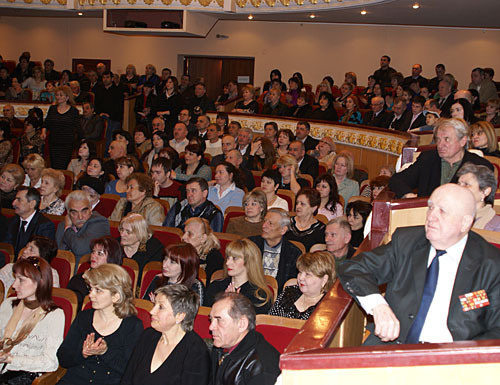Vladikavkaz residents see main problems of the region in ecology and social sphere
The complicated ecological situation because of the "Electrozink" factory, social support of veterans of local wars and retired military servicemen, departure of the population from the mountain part of the republic, life of forced migrants and broken ties with relatives living in Georgia - these are the main problems enumerated by residents of the capital of North Ossetia on March 21, when they met activists of the Project "Peace to the Caucasus", among which there were members of the Public Chamber of the Russian Federation.
As reported by the "Caucasian Knot" correspondent, on March 19 the members of the working group visited Beslan and Lesken village of the Iraf District, and on March 20 they had meetings in Tarskogo settlement of the Prigorodny District and in Balta settlement not far from the capital of North Ossetia.
Same as during previous public debates under the motto "Peace to the Caucasus" the dialogue began with answers to two questions asked by journalist Maxim Shevchenko: "Where do you see problems of your village, city and region?" and "What vision of the future do you see achievable as an alternative of settling the problem?"
Zalina Kairova, a resident of Vladikavkaz, expressed her concern of in occasion of the ecological situation around the "Electrozink" factory. According to her story, there is no clearly delineated sanitary-protective zone, while there are about 700 objects, including schools and kindergartens, within one kilometre around the factory.
"We want the Public Chamber of Russia to initiate a public independent ecological examination," she said.
Ms Kairova believes that the effluent gases cannot essentially affect the ecological situation; the increased danger stems from cadmium, indium and other industrial production wastes. According to her story, if North Ossetia is going to develop tourism, the "Electrozink" is a direct obstacle to such plans.
Another problem of Vladikavkaz was stated by Georgiy Kaloev, chairman of the board of veterans of local wars and armed conflicts, as insufficient support of Afghan war veterans. Besides, he expressed his concern that about 19,000 soldiers, who will soon retire, can fail to find employment in civil life.
Serafima Kaitukova and Hadjimurza Koliev, who live in the capital of North Ossetia, voiced for adoption of urgent measures towards stopping departure of the population from mountain villages through work towards sustainable development of these territories.
According to Mr Koliev, within the last decade, more than 700 families left the mountain part of the republic, and now the population of mountain villages consists by 80-85 percent of people in incapacitated age.
He is convinced that a law should be passed to promote creation of the necessary conditions, especially economic ones, for people to feel comfortable in the mountains.
The moderator of the discussion Maxim Shevchenko has named this offer as wise.
The journalist also shared the concern of the audience on the forced break of relations between residents of North Ossetia and their relatives living in the Kazbek District of Georgia. On March 20 he learnt about it from Balta residents and Gairbek Salbiev, leader of the public organization named "Daryal".
In the course of public debates, residents of Vladikavkaz mentioned the issue of accommodation of forced migrants among the main problems, in particular, of those who moved in early 1990s out of Chechnya and Ingushetia and settled in the suburbs of Vladikavkaz, in the settlement named Popov Khutor.
Jemal Orkhan, a special correspondent of the magazine "Russian Newsweek", promised to raise the issue of refugees and forced migrants in mass media. Besides, he plans concentrating on covering also other problems raised in the course of public hearings "Peace to the Caucasus".
Mr Orkhan believes that today's processes have shown certain inertness of the law on local self-government, which had reloaded the problems down onto the lower level of power.
"This is the reform of education, which now goes and kills those mountain villages. Application of the normative-per capita financing of schools in mountain villages threatens their existence," the "Russian Newsweek" special correspondent has emphasized.
The participants of debates also draw attention to importance of patriotic and spiritual upbringing of the youth.
The "Caucasian Knot" correspondent talked to Sergey Bazaev, one of the participants of the meeting, a resident of Vladikavkaz. He noted that the discussion, which differed by its openness and a broad range of considered topics, still gave a biased approach to the "Electrozink" issue.
"If we really wish to move forward and solve problems, this progress should be based only on industrial production. For this reason, today the labour people should have said the main word, but, probably, they were not in the room or just did not want to speak," Sergey was bewildered.
Source: CK correspondent

